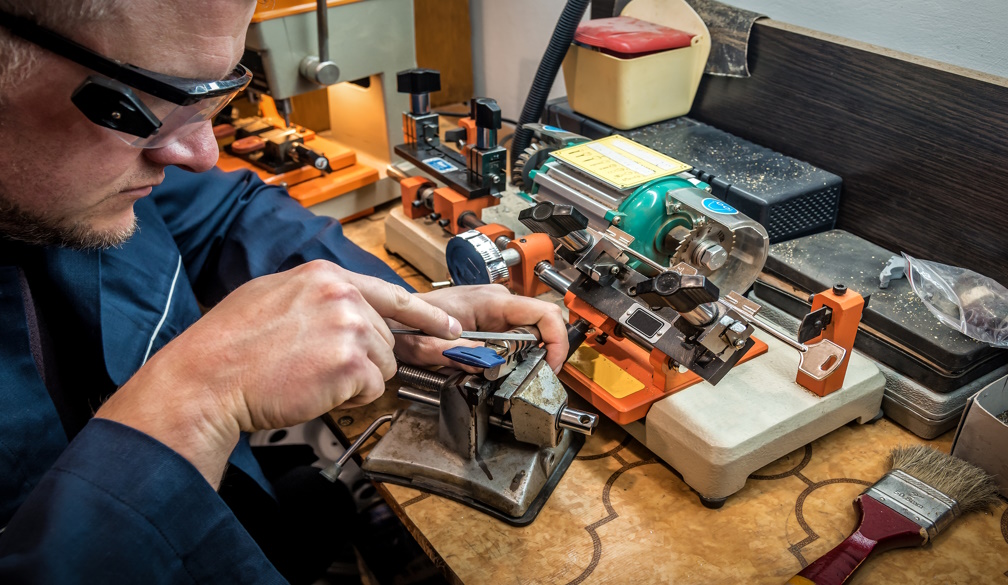The History of Locksmiths: From Ancient Times to Modern Innovations

Have you ever wondered how the art of locksmithing evolved and continues to influence our daily lives?
In an era where security is paramount, understanding the origins and advancements in locksmithing offers fascinating insights into this essential craft.
Join us as we explore the intriguing journey of locksmiths from ancient civilizations to the cutting-edge innovations that secure our world today.
The Origins of Locksmithing
Locksmithing traces its roots back to ancient civilizations, where the quest for security first began.
The First Locks
Locks were significant in ancient Egypt and Mesopotamia around 2500 BC.
These early locks were simple wooden devices, featuring a basic pin tumbler mechanism.
Although primitive by today’s standards, they provided a level of security and privacy for important buildings and storerooms.
Advancements in the Roman Era
The Romans revolutionized locksmithing by introducing metal locks and keys, using iron and bronze.
This innovation not only enhanced the durability of locks but also their complexity, incorporating more pins and unique designs.
The Roman era represents a significant period where locksmiths gained prominence as indispensable craftsmen, catering to the needs of wealthy aristocrats and merchants.
The Middle Ages: A Time of Intricacy and Innovation
The Middle Ages ushered in an era of increased intricacy in lock designs.
European locksmiths started developing more sophisticated locking mechanisms to combat the rising crime rates.
The Birth of Master Locksmiths
During this time, locksmiths emerged as master craftsmen renowned for their expertise and creativity.
Locksmiths were not only trusted with creating secure locks but also with crafting ornate designs that demonstrated status and artistry.
Lever and Warded Locks
The Middle Ages saw the development of lever and warded locks, which offered increased security through more complex key designs.
These locks featured wards—obstacles within the lock—to prevent unauthorized keys from turning, representing a significant technological advancement in the lock industry.
The Renaissance and the Evolution of Locks
The Renaissance, with its emphasis on exploration and intellectual curiosity, spurred advancements in various fields, including locksmithing.
The Introduction of Keyhole Covers
The period saw the introduction of keyhole covers to protect locks from tampering and the elements.
Ironically, these covers became a decorative element, showcasing fine craftsmanship.
Increased Precision and Complexity
As metallurgy improved, locksmiths had the tools to create more precise locks, paving the way for the intricate mechanisms we see today.
Lock designs became increasingly complex, incorporating features such as combination locks to further thwart potential intruders.
The Industrial Revolution: Mechanizing Locksmithing
The Industrial Revolution marked a transformative period for the locksmithing industry.
With the advent of machinery, locksmiths could produce locks on a larger scale, making security accessible to the general population.
The Rise of Mass Production
Prior to the Industrial Revolution, locks were bespoke items.
The introduction of mechanized processes enabled mass production, significantly reducing costs and expanding availability.
Yale and the Modern Pin Tumbler Lock
During this era, Linus Yale Jr. patented the modern pin tumbler lock, a design that remains prevalent today.
Yale's lock utilized a small, flat key, making it both user-friendly and secure, and this innovation solidified the pin tumbler lock as a standard in modern locksmithing.
Modern Innovations in Locksmithing
Today, the field of locksmithing encompasses both traditional techniques and cutting-edge technology.
The Digital Transformation
In recent years, digital locks have gained popularity, incorporating electronic and smart features for enhanced security.
These locks often include access control features, enabling users to manage security remotely through smartphones or biometric authentication.
Embracing Smart Technologies
The rise of smart home technology has driven locksmiths to adapt and integrate smart locks into their repertoire.
Smart locks offer convenience and versatility, allowing for keyless entry solutions and seamless integration with home automation systems.
The Role of Locksmiths in Contemporary Society
Today, professional locksmiths like Advanced Lock play a vital role in ensuring security, adapting to societal needs and technological advancements.
Security Consultation and Customization
Beyond traditional lock installation and repair, locksmiths offer security consultation services tailored to individual needs.
Custom solutions provide businesses and homeowners with targeted security measures that fulfill unique requirements.
Emergency Response and Support
Locksmiths continue to serve as first responders in emergencies, providing critical assistance in lockouts and security breaches.
Their expertise extends to a range of scenarios, including automotive, residential, and commercial security needs.
Preserving Traditional Skills
While technology evolves, there remains a demand for traditional locksmithing skills, particularly in restoring historic locks and hardware.
Skilled locksmiths are often tasked with preserving these pieces of historical significance, maintaining a bridge between past and present.
Future Prospects for Locksmithing
The future of locksmithing promises exciting possibilities as technology develops and societal demands shift.
Advances in Biometrics and AI
Biometric technology and artificial intelligence are poised to transform security further, offering personalized and highly secure solutions.
Locksmiths are at the forefront of implementing these innovations, ensuring they are accessible and user-friendly.
Continuous Adaptation and Learning
As the security landscape evolves, locksmiths must continually adapt, enhancing their skills and staying informed about technological advances.
Continued education and specialization enable locksmiths to remain relevant and effective in serving their communities.
Final Words
The legacy of locksmithing, rich in history and innovation, is a testament to our enduring quest for security and peace of mind.
Today's locksmiths, heirs to centuries of craftsmanship and ingenuity, are uniquely positioned to address the diverse security challenges of the modern world.
From simple wooden mechanisms to sophisticated digital solutions, the evolution of locksmithing reflects a dynamic interplay between tradition and innovation, shaping the way we protect our most valuable assets.





